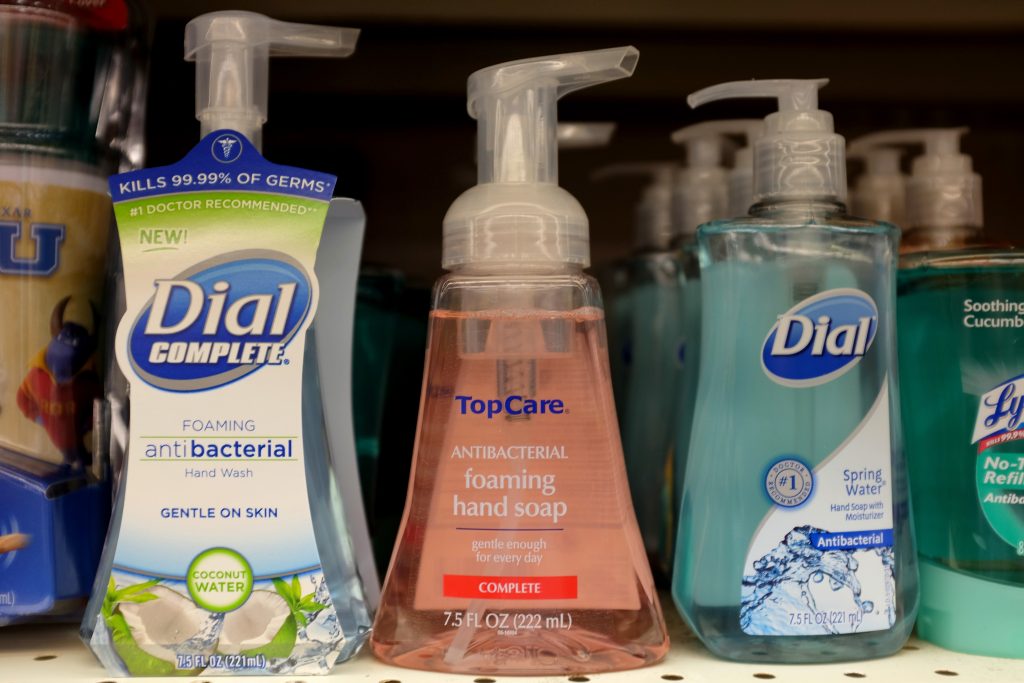
Figure 1: Common Antibacterial soap sold at grocery stores. Author: Joe Raedle from Getty Images. Source: http://www.pbs.org/newshour/rundown/antibacterial-soap-may-harm-good-fda-says/
If consumers are given the choice of plain soap or antibacterial soap, the majority of the consumers would prefer to purchase antibacterial soap. It is because antibacterial soap is known to control the spread of germs. However, antibacterial soaps will soon no longer be found in grocery stores in the United States. The U.S Food and Drug association (FDA) has officially banned 19 soap ingredients that are known to be the “germ killers” (1). However, Jane Woodcock, the director of FDA’s Centre for Drug Evaluation and Research, claims there is no supportive evidence that antibacterial soap is more effective in killing germs than plain soap and water (1).
Blaise Boles, a microbiologist from the University of Michigan, conducted a study showing triclosan(2), an ingredient commonly found in antibacterial soaps, increases the risk of people getting staph infection (4). Staph infection is caused by staphylococcus bacteria that can be found in the nose or on the skin of an individual (4) Boles and his colleagues swabbed 90 people’s noses to collect samples. The results showed 37 people had triclosan present in their nasal secretions, and 64% of these people were infected with staph(3). The researchers were surprised by the findings of the study because triclosan is previously acknowledged to reduce bacteria contamination. FDA expresses their concerns over the health risks associated with long-term use of antibacterial soaps. The chance of one getting pneumonia increases when they are infected with staph.
There are not many studies showing triclosan-resistant bacteria poses any major health risks to consumers. However, FDA decides to ban retail stores from selling antibacterial soaps to the general public in U.S unless the manufacturers can provide supportive evidence that antibacterial soap is capable of killing bacteria. The U.S Centers for Disease Control and Prevention (CDC) instructs citizens to scrub their hands with plain soap for at least 20 seconds before washing under running water (5). An alternative way to reduce the spread of germs and avoid getting sick is using hand sanitizer with at least 60% alcohol (5).
The take home message is that antibacterial soap does not necessary halt the spread of germs more effectively than regular soap. As long as the general public uses the regular soap to wash their hands as instructed by CDC, the regular soap can also reduce the spread of germs. Therefore, the consumers do not have to spend a dollar or more on purchasing the antibacterial soap.

The following video shows the proper way of washing hands:

References:
- Science News for Students. Science & Society, Microbes: U.S. to outlaw antibacterial soaps. https://www.sciencenewsforstudents.org/article/us-outlaw-antibacterial-soaps (accessed on Oct 22nd, 2016).
- David Suzuki Foundation. Triclosan. http://davidsuzuki.org/issues/health/science/toxics/chemicals-in-your-cosmetics—triclosan/ (accessed on Oct 23rd, 2016).
- MOLE, B. (2014). Body & brain: Triclosan aids nasal invasions by staph: Antimicrobial compound may help bacteria stick around. Science News, 185(10), 12. doi:10.1002/scin.5591851011
- Mayo Foundation for Medical Education and Research. Disease and Conditions: Staph infections. http://www.mayoclinic.org/diseases-conditions/staph-infections/basics/definition/con-20031418 (accessed on Oct 24th, 2016).
- Centres for Disease Control and Prevention. Hand washing: Clean Hands Save Lives. http://www.cdc.gov/handwashing/when-how-handwashing.html (accessed on Oct 22nd, 2016).
Photo source:
- Copyright information: http://www.pbs.org/newshour/rundown/antibacterial-soap-may-harm-good-fda-says/
